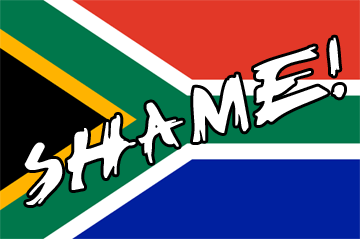SA ADVOCATES SLAM GOV FOR SILENCE ON NIGERIA
 The body that represents South Africa’s advocates, The General Council of the Bar of South Africa (GCB), has criticised the government’s continued silence on recent draconian anti-gay laws in Africa.
The body that represents South Africa’s advocates, The General Council of the Bar of South Africa (GCB), has criticised the government’s continued silence on recent draconian anti-gay laws in Africa.
In a media statement, the GCB’s Chairperson Ishmael Semenya SC, said that South Aftica’s constitution “which entrenches human dignity, the achievement of equality and the advancement of human rights and freedoms as well as non-sexism as core values, implores the government to uphold and respect such values, not only domestically, but also internationally.”
He went on to say: “The GCB decries this position. No-one should be punished or discriminated against because of their sexual orientation or association. South Africa is rightly seen as a beacon of hope for the advancement and protection of human rights around the world – including the rights of gay, lesbian, transgendered and intersex people.
“The GCB calls on the government to live up to this reputation, to set the right example to its own citizens and to the rest of the world, and to condemn anti-gay legislation and practices wherever they exist.”
In recent weeks, both Ugandan and Nigerian legislators ramped up laws cracking down on LGBT people, further criminalising gay relationships and banning same-sex marriages and LGBT organisations. Penalties range from 10 years in prison to life sentences.
The DA, recently also urged the Minister of International Relations and Cooperation, Maite Nkoana-Mashabane, for clarity on the government’s position on the anti-gay legislation, saying that “the South African government can no longer remain silent while lesbian, gay, bisexual, transgender and intersex (LGBTI) rights are under attack and infringed upon in Nigeria and other countries around the world.”
Throughout these recent developments and despite calls for action and condemnation, South Africa has remained silent.
In its recent World Report 2014, Human Rights Watch commented that “South Africa played an important but inconsistent role in advancing the human rights of LGBT people internationally.”
But, while it praised the country for being instrumental in introducing a precedent-setting 2011 resolution at the UN Human Rights Council on combating violence and discrimination against LGBT people, it noted that South Africa “has not played a decisive leadership role on this issue at the UN since then”.
Thirty-eight countries in Africa criminalise homosexuality and South Africa appears particularly reticent to single out African countries when it comes to LGBT human rights abuses. Adding insult to injury, the government continues to retain openly homophobic former journalist Jon Qwelane as South Africa’s high commissioner in Uganda, despite him still facing anti-gay hate speech charges back home.
Leave a Reply